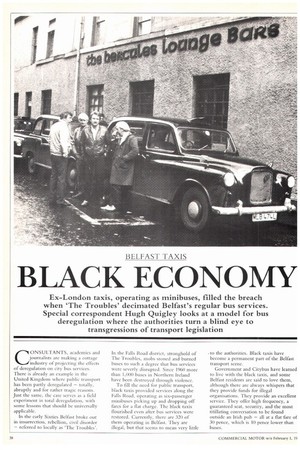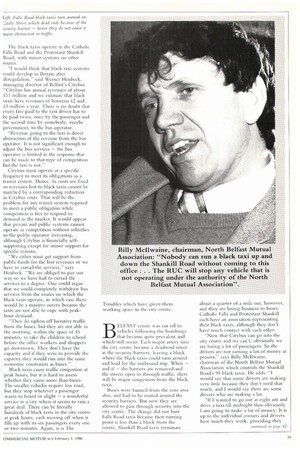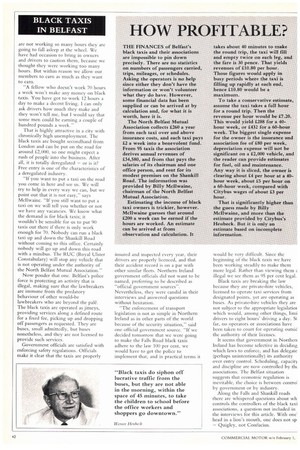BLACK ECONOMY
Page 38

Page 39

Page 42

If you've noticed an error in this article please click here to report it so we can fix it.
Ex-London taxis, operating as minibuses, filled the breach when 'The Troubles' decimated Belfast's regular bus services. Special correspondent Hugh Quigley looks at a model for bus deregulation where the authorities turn a blind eye to transgressions of transport legislation
CONSU LTAN TS, academics and journalists are making a cottage industry of projecting the effects of deregulation on city bus services. There is already an example in the United Kingdom where public transport has been partly deregulated — totally, abruptly and for rather tragic reasons. Just the same, the case serves as a field experiment in total deregulation, with some lessons that should be universally applicable.
In the early Sixties Belfast broke out in insurrection, rebellion, civil disorder — referred to locally as The Troubles'. In the Falls Road district, stronghold of The Troubles, mobs stoned and burned buses to such a degree that bus services were severly disrupted. Since 1960 more than 1,000 buses in Northern Ireland have been destroyed through violence.
To fill the need fir public transport, black taxis provided services along the Falls Road. operating as six-passenger minibuses picking up and dropping off fares for a flat charge. The black taxis flourished even after bus services were restored. Currently, there are 320 of them operating in Belfast. They are illegal, but that seems to mean very little to the authorities. Black taxis have become a permanent part of the Belfast transport scene.
Government and Citybus have learned to live with the black taxis, and sonic Belfast residents are said to love them, although there are always whispers that they provide funds for illegal organisations. They provide an excellent service. They offer high frequency, a guaranteed scat, security, and the most titillating conversation to be found outside an Irish pub — all at a flat fare of 30 pence, which is 10 pence lower than buses. The black taxis operate in the Catholic Falls Road and the Protestant Shankill Road, with minor systems on other routes, "I would think that black taxi systems could develop in Britain after deregulation," said Werner Heubeck, managing director of Belfast's Citybus. "Citybus has annual revenues of about i'.11 million and we estimate that black taxis have revenues of between i22 and .0 million a year. There is no doubt that every fare paid to the taxi driver has to be paid twice, once by the passenger and the second time by somebody, maybe government, to the bus operator.
"Revenue going to the taxi is direct abstraction of the revenue from the bus operator. It is not significant enough to adjust the bus services — the bus operator is limited in the response that can be made to that type of competition but the taxi is not."
Citybus must operate at a specific frequency to meet its obligations as a transit system. Hence, its costs arc fixed so revenues lost to black taxis cannot be matched by a corresponding reduction in Citybus costs. That will be the problem for any transit system required to meet a public obligation while competition is free to respond to demand in the market. It would appear that private and public systems cannot operate in competition without subsidies to the public operator increasing, although Citybus is financially selfsupporting except for minor support for specific reasons.
We either must get support from public funds for the lost revenues or we have to curtail the services," says Heubeck. "We are obliged to pay our way so we have had CO curtail the services to a degree. One could argue that we could completely withdraw bus services from the routes on which the black taxis operate, in which case there would be a massive outcry because the taxis are not able to cope with peakhour demand.
"They do siphon off lucrative traffic from the buses, but they are not able in the morning, within the space of 45 minutes, to take the children to school before the office workers and shoppers go downtown. They don't have the capacity and if they were to provide the capacity they would run into the same economic constraints as buses."
Black taxis cause traffic congestion at peak hours, but it is hard to assess whether they cause more than buses. The smaller vehicles require less road, but they stop wherever a passenger wants to board or alight — a wonderful service in a city where it seems to rain a great deal. There can be literally hundreds of black taxis in the city centre at peak hours, each moving off when it fills up with its six passengers every one or two minutes. Again, is is The Troubles which have given them working space in the city centre.
BELFAST centre was cut off to vehicles following the bombings that became quite prevalent and which still occur. Each major artery into the city centre became a dead-end street at the security harriers, leaving a block where the black taxis could turn around and load for the outbound trip. When — and if — the barriers are removed and the streets open to through traffic, there will be major congestion from the black taxis.
Buses were banned from the core area also, and had to be routed around the security barriers. But now they are allowed to pass through security into the city centre. The change did not hurt Falls Road taxis because their turning point is less than a block from the centre. Shankill Road taxis terminate about a quarter of a mile out, however, and they arc losing business to buses. Catholic Falls and Protestant Shankill each have an association representing their black taxis, although they don't have much contact with each other.
"Now that Citybus can go into the city centre and we can't, obviously we arc losing a lot of passengers. So the drivers are not earning a lot of money at present," says Billy McIlwaine, chairman of the North Belfast Mutual Association which controls the Shankill Road's 95 black taxis. He adds: "I would say that some drivers are making very little because they don't need that much, and I would say there are some drivers who are making a lot.
"If I wanted to go out at eight am and drive a taxi fill midnight then obviously am going to make a lot of money. It is up to the individual owners and drivers how much they work, providing they are not working so many hours they arc going to fall asleep at the wheel. We have had occasion to bring in owners and drivers to caution them, because we thought they were working too many hours. But within reason we allow our members to earn as much as they want to earn.
"A fellow who doesn't work 70 hours a week won't make any money on black taxis. You have got to work 12 hours a day to make a decent living. I can only ask drivers how much they make and they won't tell me, but I would say that some men could be earning a couple of hundred pounds a week.
That is highly attractive in a city with chronically high unemployment. The black taxis are bought secondhand from London and can be put on the road for around £2,000, so one might expect a rush of people into the business. After all, it is totally deregulated — or is it? Free entry is one of the characteristics of a deregulated industry.
"If you want to put a taxi on the road you come in here and see us. Wc will try to help in every way we can, but we point out that it is not easy," says McIlwaine. "If you still want to put a taxi on we will tell you whether or not we have any vacancies. We know what the demand is for black taxis; it wouldn't be sensible for us to put 90 taxis out there if there is only work enough for 70. Nobody can run a black taxi up and down the Shankill Road without coming to this office. Certainly nobody will go up and down this road with a minibus. The RUC (Royal Ulster Constabulary) will stop any vehicle that is not operating under the authority of the North Belfast Mutual Association."
Now ponder that one. Belfast's police force is protecting an activity that is illegal, making sure that the lawbreakers are immune from the predatory behaviour of other would-be lawbreakers who are beyond the pale. The black taxis arc operated as jitneys, providing services along a defined route for a fixed fee, picking up and dropping off passengers as requested. They are buses, small admittedly, but buses nonetheless, and they are not licensed to provide such. services.
Government officials are satisfied with enforcing safety regulations. Officials make it clear that the taxis are properly insured and inspected every year, their drivers are properly licenced, and that their accident record is on a par with other similar fleets. Northern Ireland government officials did not want to be named, preferring to be described as "official government sources". Nevertheless, they were candid in their interviews and answered questions without hesitation.
"The enforcement of transport legislation is not as simple in Northern Ireland as in other parts of the world because of the security situation," said one official government source. "If we decided tomorrow that we were going to make the Falls Road black taxis adhere to the law 100 per cent, we would have to get the police to implement that, and in practical terms it
would be very difficult. Since the beginning of the black taxis we have been working steadily to make them more legal. Rather than viewing them illegal we see them as 95 per cent legal.
Black taxis are breaking the law because they are private-hire vehicles, licensed to operate taxi services from designated points, yet are operating as buses. As private-hire vehicles they are not subject to the appropriate legislatior which would, among other things, limi drivers to eight hours' driving a day. far, no operators or associations have been taken to court for operating outsid the authority of their licenses.
It seems that government in Norther' Ireland has become selective in deciding which laws to enforce, and has delegate (perhaps unintentionally) its authority over entry control. Scheduling, capacity and discipline are now controlled by th( associations. The Belfast situation suggests that economic regulation is inevitable, the choice is between control by government or by industry.
Along the Falls and Shankill roads there are whispered questions about wh controls the controllers of the black taxi associations, a question not included in the interviews for this article. With one' head in a lion's mouth, one does not sp. —Quigley, not Confucius.




















































